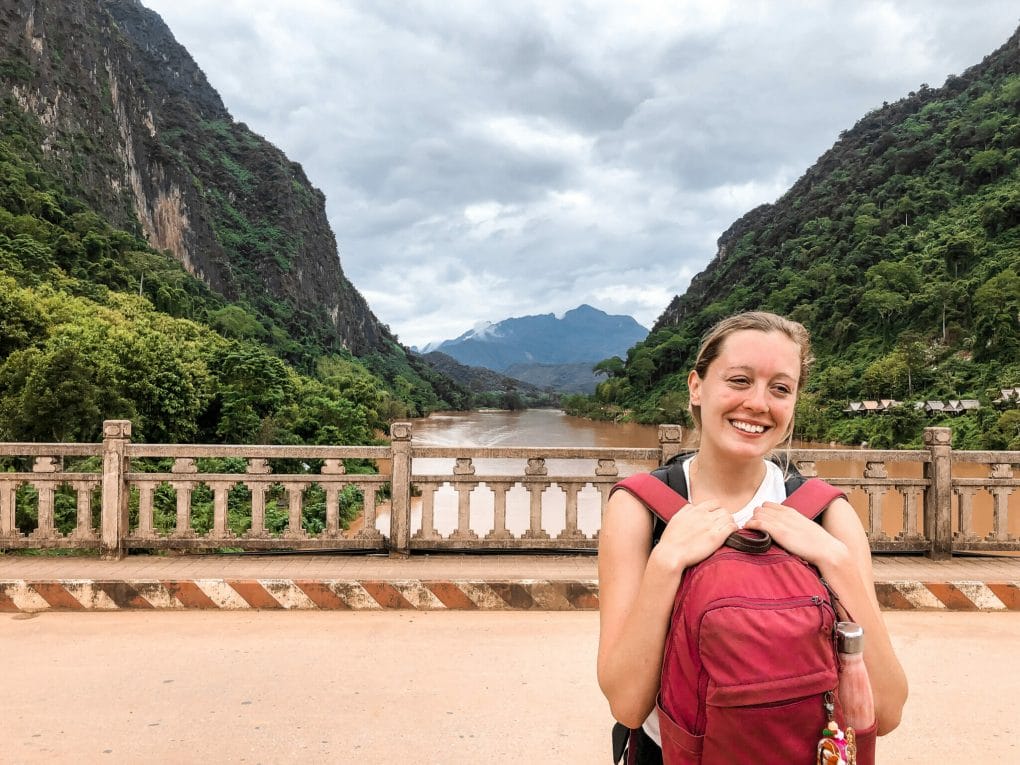If you’ve ever thought to yourself, I want to travel the world, where do I start? I have a few ideas for you!
When I was a high schooler all the way back in the late 2000s, I often found myself daydreaming about this very thing. I desperately wanted to get outta my hometown to travel and see more of the world.
So, I did just that! I worked as a dishwasher to save money to partake in my high school Spanish school trip to Peru. I chose a university with a great study abroad program, and studied abroad in Copenhagen my junior year.
A couple of years after I graduated college I quit my job to teach English in South Korea and then Vietnam, living and traveling around Asia for 2.5 years. And my most recent adventure was getting my Master’s degree in Germany.
Incorporating travel in your life doesn’t have to be unattainable! You just need to have an open mind and get a little creative to make it work, even if you’re low on funds.
This post may contain affiliate links, meaning at no additional cost to you, if you click my links and make a purchase, I may earn a small commission. Learn more on my disclosure page. Thank you for your support!

7 Tips For Incorporating Travel Into Your Life
There’s no quick or free way to travel, but here are some ways I’ve been able to travel so much in my young adult life.
Make it a part of your life
As the world continues to be ever more interconnected, there are many ways to make travel an integral part of your life.
Personally, I’ve found ways to travel by studying abroad in college, working a job that allowed me to travel around the U.S., working abroad, and even completing an entire degree abroad.
Make it a priority to save money
The truth of the matter is that even if you’re one of the lucky folks who can make a career out of straight traveling, it still costs money or time.
So saving money is of the utmost importance. I rarely shop for clothes and limit my eating out mostly to travel.
I also recommend opening a High Yield Savings Account to earn passive income on your savings and looking into investing.
Read more: How to Afford Travel: Ways to Make Room in Your Budget
Be open to any and all possibilities
There are beautiful places to be discovered everywhere, not just the popular places on social media, so keeping an open mind can open so many travel doors than you may not have otherwise expected.
For example, I switched my major from Spanish to Danish in college because I found a far less competitive scholarship to study in Denmark than I did for Chile (my original plan). Denmark had never even been on my radar until one day I sat next to a young woman on a flight, who’d just gotten home from her own study abroad experience in Denmark. She spoke so highly of it, I looked into it myself.
I chose to teach English in South Korea over my dream destination of Thailand because the pay and benefits were substantially better. And it ended up being the best 2 years of my life where I made lifelong friends!
This isn’t to say that you should sacrifice your goals. However, being open-minded and excited about any and all possibilities has opened many more doors for me than if I had been focused on only one option.

Don’t be afraid to go alone
Solo travel is one of my favorite ways to experience a place, and it’s truly one of the most empowering and freeing things I’ve ever done for myself. And it allows me to visit a place on my terms, at my preferred pace, and without having to answer to another person’s opinion.
But I won’t lie, the first and second times were scary! But I realized that if I waited around for someone to agree to save money, set aside time, and put in the effort to go on an adventure, I’d be waiting more than I’d be out seeing the world!
Trust me when I say that it only gets easier, and if you do it right, it doesn’t have to be expensive.
Read more: Why You Should Do Something that Scares You
Don’t shy away from budget travel
This leads me to my next point: budget travel is how to travel more frequently and for longer. It’s the number one way I’ve been able to travel so much on an arguably low annual income with student loans.
By budget travel I mean that I frequently book hostels, free walking tours, take public transportation, choose street food, skip partying, avoid shopping etc.
Now, I’m not saying to cut all the fun stuff out completely. I simply mean to do things in moderation and to predominantly pick the cheap route! And to make a realistic budget and try to stick to it.
Now that I’m older and have a partner to help offset costs, budget travel looks more like $100 per night hotel rooms but still choosing walking, and public transportation.
Read more: Hostel Etiquette: 15 Unspoken Hostel Rules Everyone Should Know

Set realistic expectations and decide if you want to travel vs vacation
There’s a difference between traveling and vacationing. Both are great in their own ways, but there is a difference!
Vacationing is usually more expensive, but honestly, it is still largely unattainable, even for me. We went to the Greek islands on vacation in 2023, and it was one of the most expensive trips I’ve ever paid for. I’m so glad I went, but my partner and I find greater value in multiple cheaper trips than in one large, expensive trip.
When I worked a standard 9-5 after college for a few years, I knew with my limited funds and vacation time, I wasn’t able to travel full-time. But I made a point to travel to two international places each year, adventure to nearby destinations in my backyard on the weekends, and live life to the fullest where I was.
An acknowledgment of travel privilege
At the end of the day, I’ve been able to travel as much as I have because I have travel privileges. So, while I can do my best to offer practical tips for all the ways to incorporate travel into your life, I know and understand that not all are applicable to every person and every situation.
So, I’m taking a moment to acknowledge that I can travel with ease because of the life choices I make and because:
- I’m able-bodied
- I’m childless
- I have a college degree
- I have a U.S. passport and speak English
- I have parents who support all my decisions and that I can rely on when I’m home
- I’ve been fortunate to have found ways to offset my cost of living (roommates, jobs that include housing, a partner in the military who receives a housing stipend)

15 Practical and Attainable Ways To Incorporate Travel In Your Life
The glamorized life on social media of folks who get paid to travel and earn enough to afford life’s expenses just by traveling is not easy, quick, or a reality for everyone.
However, there are some practical and attainable ways “normal” people can travel the world, and I’m here to share some ideas! Admittedly, not everything will work for you depending on a multitude of things.
But here are ways you can travel when you’re unsure where to start.

1. Study Abroad in High School
When I was growing up, long-term opportunities to study abroad in high school were not only few and far between, but not really talked about at my school. I was just lucky that I had a dedicated Spanish teacher that planned an epic trip for our class to travel to Peru!
But today, high school study abroad is becoming much more common thanks to our continually interconnected world, growing interest in travel, and numerous programs catering to young people interested in the experience.
While studying abroad requires money for the program, tuition fees, flights, etc., there are quite a few scholarships you can apply for to help offset costs!
One of the country’s most reputable companies is CIEE High School Study Abroad. They offer 60+ programs that vary in length from year, semester, to summer in more than 50 countries. The CIEE Global Navigator Scholarship helps hundreds of participants fund their travels.

2. Study Abroad in College
If you’re planning on going to college or currently working on your degree, I highly recommend looking into studying abroad. You’re already paying tuition fees, so usually, adding a study abroad program doesn’t add all too much to your expenses for the year.
Similarly, there are many scholarships available for college study abroad. From private to public, and funding options dedicated to specific fields of study, it can help offset the cost for those who can’t afford the extra cost study abroad brings.
In college I studied abroad in Copenhagen for the academic year after securing a $11,000 scholarship through the Scandinavian Design Foundation. My choice was strategic, as I knew Denmark was not super popular and competitive, bettering my chances of winning the scholarship.

3. Get Your Degree Abroad
Another option for university bound folks is to get your entire degree abroad. University is expensive in the United States, so allocating those funds to a degree abroad is a great way to still get a higher education but with the added bonus of living abroad. It’s a win win!
Some countries even offer more affordable degree programs compared to the U.S. and if you know where to look, some countries have tuition free degree programs open to international students (Germany)!
Another option is to apply for a Fulbright grant from the U.S. government. These grants allow students to study their desired subject abroad with a government-sponsored grant to offset costs. Fulbrights are very competitive and prestigious awards.
Read more: What is the Cost of Studying in Germany?

12. Maximize Your Vacation Days in Your 9-5
Simply put, just because you work a 9-5 doesn’t mean you can’t travel! After I graduated I worked a normal 9-5 for nearly 3 years where I prioritized traveling abroad twice a year within my $30,000 salary and limited 10 vacation days.
Even when I taught in Korea, I was working a 9-5 and could only take two big trips a year during school breaks. Being a weekend warrior can be a lot of fun!
I recommend getting creative and doing some advance planning to best apply your vacation days with holiday weekends to maximize your time off at a time!

4. Take Advantage of Airline Stopover Programs
Did you know that some airlines offer free stopover programs? A stopover is essentially a free day or two to travel where an airline is headquartered.
For example, if you’re flying from Chicago to Barcelona with Portuguese airline TAP Portugal, you can plan a stopover and spend a day or two in Lisbon! Some airlines even offer free or discounted hotel stays as a way to entice travelers to visit and boost the local economy.
Some airlines with stopover programs include:
- UAE: Etihad stopover in Abu Dhabi or Emirates stopover in Dubai
- Portugal: Tap AirPortugal stopover in Lisbon or Porto
- Qatar: Qatar Airways stopover in Doha
- Turkey: Turkish Airlines stopover in Istanbul
- Iceland: Iceland Air stopover in Reykjavik

5. Apply for a Working Holiday Visa
A working holiday visa allows young adults aged 18-30, sometimes 35, to move to a country for six months to a year and work part-time while traveling.
It’s a great way for people to earn some money while temporarily living and traveling in a new place! Some countries even allow visa holders to study or extend it for another 6-12 months or longer.
Eligible Americans can get a working holiday visa in six countries: South Korea, Australia, Ireland, New Zealand, Canada, and Singapore.

6. Teach English Abroad
One of the best ways I’ve been able to travel so much is that I got TEFL certified and taught English abroad in South Korea! I taught English for two years, which allowed me to explore Korea, take international trips during school breaks, and backpack Southeast Asia for six months after I completed my contract!
There are many ways to teach English abroad, but choosing the EPIK Program will always hold a special place in my heart. You can apply independently or go through a recruiter like Korvia or a designated third party like CIEE TEFL and Teach Abroad.
Save $200 off any CIEE Teach Abroad program for first-time applicants.
Read more: Best Places to Teach English Abroad

7. Become an Au Pair
Another unique visa that allows people to live in different countries is an au pair visa! An au pair is essentially a live-in nanny who is hired by a family to take care of young children and sometimes help out with household chores or language tutoring.
I’m a big fan of opportunities to earn an income while living in a new place because it makes traveling easier. To apply, you often need to be under 30 and have no dependents.
Eligible Americans can apply for an au pair visa in countries like Ireland, New Zealand, and Italy.

8. Apply for a Digital Nomad Visa
The number of countries offering digital nomad visas is steadily on the rise, providing the unique chance to live in a different country while working remotely.
The qualifications for digital nomad visas vary widely, but generally you’ll need to prove that you make a minimum amount per month ($3,000-$5,000+). You may also have to show proof of savings or have work that can benefit the local economy.
Digital nomad visas for Americans can be found in places like Estonia, Mexico, Portugal, Malaysia, etc.

9. Nab a Travel Related Job
With a little effort, persistence, and creativity, there are a lot of travel jobs out there, and even non-travel industry jobs that involve travel or have offices abroad.
Some of the more obvious ones, a few of which I’ve done or I know someone who’s done, include:
- Travel writer, marketer, coordinator
- Tour guide
- Study abroad coordinator
- Photographer
- Flight attendant
- Crew on a yacht or cruise line
10. Go on a Workaway
For a short stint abroad, there are numerous Workaway programs that connect you with opportunities abroad. A Workaway is typically designed to offer travelers room and board in exchange for work. Some positions even offer additional pay as an allowance.
You can check out what the specific workaway programs on offer are (for a membership fee), but there are opportunities that range from farming to tutoring, to working at a hostel to leading tourism events.

11. Consider WWOOFing and Work on a Farm Abroad
WWOOF, World Wide Opportunities on Organic Farms, is an exchange program that was founded in the UK in 1971. Those who participate can expect to work in exchange for room and board on farms abroad.
There’s a small fee, but there are exciting opportunities in places like Africa, the Asia-Pacific, and South America.
13. Volunteer
Although it’s not lucrative, there are many volunteer opportunities abroad and in the States. Those who’d like to make a difference while seeing the world should consider checking out non-profits like the Peace Corps, Americorps, and Doctors Without Borders.
This is likely not possible for those with student loans or debt of any kind because of the non-existent salary but many of these programs do offer a stipend to offset basic living costs.

14. Use a Credit Card to Earn Rewards and Try Travel Hacking
Something I’ve been trying to get into myself is the art of travel hacking! Many people are able to afford more lavish travels by strategically collecting credit card rewards points through card opening bonuses and intentional spending.
This is really only best for those who are good about spending within your means and not racking up credit card debt otherwise it defeats the purpose. But popular reward credit cards to start with include Chase Sapphire Preferred, Chase INKs, and Amex.
You can learn more through various online courses and communities. One that’s free and very in-depth is 10xTravel, which offers an introductory course on credit cards and collecting points.
Read more: My Personal Chase Sapphire Preferred Review

15. Join the Military or Work for the Government Abroad
This recommended way to travel is not to be taken lightly as joining the military is a major commitement and not for everyone. However, if you’ve ever considered the military and also have a desire to travel, the military is one way to do so.
The military provides some great pros (and cons of course) that can help make travel more attainable. They offer job placements abroad, provide housing and sometimes cost of living stipends, pay for relocating abroad, and more.
My partner is in the Air Force and has been stationed in places like Guam, South Korea, and Germany. But it’s not all fun and games, as you don’t get much choice in placement and can be deployed anywhere in the world.
A less drastic option is to apply for government jobs abroad. With so many military bases and consulates/embassies abroad, there are a surprising number and range of options for working abroad as a civilian. Everything from physical therapist to fast food cashier and beyond, the possibilities are endless. I recommend checking out USAJOBS to see current openings abroad.

Or, Simply Budget, Save, and Embrace inconvenience
Probably the most practical and unglamorous way to travel is simply to budget, save, and plan around your current life and income.
Some ways I’ve funded travel on a low salary are:
- Taking a bumped flight voucher: I once got a $400 Delta voucher that allowed me to travel to Banff for a long weekend
- Collecting any and all reward miles, points, etc. I’ve redeemed three free international round-trip flights doing this.
- Choosing affordable destinations: I backpacked India for two months for about $1,500, much less than what my cost of living would have been at home
- Taking advantage of travel sales: last-minute vacation packages, Lufthansa Surprise, sales on airlines, etc.
- Flying budget airlines because they’re super cheap and take only a carry-on (hello, Ryanair for budget travel in Europe)
- Staying in cheap accommodation: hostels when I was in my 20s, now under $100 hotels as much as possible
- Limiting shopping and eating out
There you have it! Some of the (sorta) easy ways to travel for anyone who has ever wondered – I want to travel the world, where do I start?



